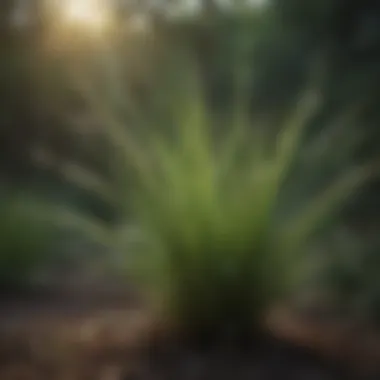Natural Ways to Keep Mosquitoes Away from Your Yard Without Chemicals


Preventive Pest Control Strategies
When it comes to keeping pesky mosquitoes at bay in your yard, implementing effective preventive pest control strategies is paramount. To start, focus on protecting the exterior of your house. Ensure to seal any cracks in walls and windows, as these can serve as entry points for pests. Additionally, clearing out debris like leaves and stagnant water helps eliminate breeding grounds for mosquitoes. Regular yard maintenance is crucial in preventing pest infestations. By following essential care routines such as mowing the lawn regularly and trimming bushes, you can keep your yard pest-free.
Maintaining indoor cleanliness is just as important. Expert cleaning tips can help you create a pest-resistant environment indoors. Ensuring that your garbage disposal methods are efficient and proper also plays a vital role in deterring pests. Proper waste disposal not only keeps your home clean but also removes attractants for pests. Explore innovative ways to safeguard your home against various pests beyond just mosquitoes.
Identifying Pest Risk Areas
To effectively control pests in your yard, it's essential to identify potential risk areas. Begin by inspecting moisture-prone areas, such as leaky pipes or standing water, as these environments attract pests like mosquitoes. Properly identifying and addressing these conditions can help prevent infestations. Conduct a thorough inspection of cracks and crevices around your home to seal off possible entry points for pests. Moreover, paying attention to greenery and its impact on pests is key. Be mindful of landscaping elements that may harbor mosquitoes and other pests.
Don't overlook other potential risk areas around your property, as pests can find shelter in unexpected places. By identifying and addressing these areas promptly, you can mitigate the risk of pest infestations.
Effective Pest Control Methods
When it comes to pest control, opting for natural repellents can be a safe and effective choice. Utilizing essential oils, herbs, and plants known for their repellent properties can help keep pests at bay without harmful chemicals. However, if necessary, chemical sprays can also be used safely for pest eradication. Pest traps provide an effective solution for capturing and removing pests while minimizing harm to the environment. Additionally, considering biological control methods, such as introducing natural predators, can offer long-term pest management solutions.
Explore other innovative pest control methods that go beyond traditional options to address specific pest issues in your yard comprehensively.
Pest Species Identification
To effectively combat pest infestations, it's crucial to identify the types of pests in your environment. Common insects like ants, cockroaches, and spiders can be managed more effectively once recognized. Similarly, being able to identify rodent species like mice and rats enables you to take preventative measures against them. Addressing bird-related issues and dealing with wildlife encounters on your property are also important aspects of pest control.
Furthermore, keep an eye out for lesser-known pests that may pose a threat to your home and environment. Effective management of various pest species requires a thorough understanding of their behaviors and habitats.


DIY Pest Control Techniques
Exploring do-it-yourself pest control techniques can provide eco-friendly solutions to pest problems. By utilizing homemade remedies and essential oils known for their pest-repelling properties, you can create a bug-free environment at home. Setting up effective pest traps and barriers adds an additional layer of defense against pests.
Consider reputable pest control brands that offer products designed for home pest management. These trusted solutions can help safeguard your home effectively. Lastly, delve into unique and innovative DIY pest control techniques tailored to address specific pest issues that you may encounter in your home.
Introduction
In the realm of outdoor living, keeping pesky mosquitoes at bay is a top priority for anyone looking to enjoy their yard without the nuisance of buzzing insects. This article delves into the realm of natural mosquito deterrents, offering a bounty of strategies that not only repel these unwelcome visitors but do so without the need for harmful chemicals or sprays, ensuring a safe and environmentally-friendly approach to mosquito control. By exploring the various facets of deterring mosquitoes naturally, you can transform your outdoor space into a haven free from buzzing pests and chemical residues.
The importance of this topic cannot be overstated, as mosquitoes not only disrupt outdoor activities but also pose health risks due to their potential to transmit diseases. Understanding how to effectively deter mosquitoes using natural methods is not only beneficial for creating a peaceful outdoor environment but also contributes to the well-being of your family and pets. This comprehensive guide will walk you through each facet of natural mosquito control, from uncovering the factors that attract mosquitoes to implementing physical barriers and traps, providing you with a wealth of knowledge to protect your yard from these unwelcome guests. By immersing yourself in the insights presented in this article, you can proactively take charge of mosquito management in your yard, paving the way for enjoyable outdoor experiences free from the buzz and bite of mosquitoes.
Understanding Mosquito Behavior
In this section, we delve into the crucial topic of understanding mosquito behavior and its significance in deterring these pesky insects from invading your yard. By comprehending the behavioral patterns of mosquitoes, you can effectively implement strategies to keep them at bay. Understanding mosquito behavior entails studying their attraction factors, breeding grounds, and habits. By gaining insights into these areas, homeowners can develop targeted and effective mosquito control methods that are natural and environmentally friendly.
Attraction Factors for Mosquitoes
The attraction factors for mosquitoes play a vital role in understanding how these insects are drawn to certain environments. Factors such as body heat, sweat, and carbon dioxide emissions attract mosquitoes to potential hosts. Additionally, dark-colored clothing and certain scents can also make individuals more attractive to mosquitoes. By being aware of these attraction factors, homeowners can take proactive measures to minimize their attractiveness to mosquitoes. This can include wearing light-colored clothing, avoiding strong-scented perfumes, and using repellents that mask body odors.
Breeding Grounds Identification
Identifying and eliminating breeding grounds is essential in mosquito control. Mosquitoes lay their eggs in standing water, making stagnant pools, bird baths, and clogged gutters prime breeding sites. By regularly inspecting your yard for areas of standing water and removing them, you can significantly reduce mosquito populations. Implementing drainage systems, covering water sources, or using larvicides can help prevent mosquitoes from breeding and multiplying. By understanding the importance of eliminating breeding grounds, homeowners can effectively disrupt the mosquito life cycle and reduce their presence in the yard.
Natural Repellents and Plants


When it comes to natural repellents and plants, there are various key elements to consider. Firstly, opting for plants that naturally repel mosquitoes, such as citronella, lavender, mint, and marigold, can be highly effective in discouraging these pests from infesting your yard. These plants not only add beauty to your outdoor space but also serve a dual purpose of enhancing aesthetics while acting as natural deterrents.
Additionally, essential oils have been proven to be potent mosquito repellents. Essential oils like citronella, eucalyptus, lavender, and tea tree oil can be diluted and used as sprays to ward off mosquitoes effectively. The pleasant fragrance of these oils adds a refreshing scent to your yard while keeping mosquitoes away naturally.
Furthermore, installing citronella candles can also aid in mosquito control. These candles, infused with citronella oil, release a scent that is unappealing to mosquitoes, helping to create a mosquito-free zone in your outdoor area. By strategically placing these candles around seating areas or hanging them in key spots, you can enhance the effectiveness of your mosquito deterrence strategy.
By incorporating natural repellents and plants into your mosquito control regimen, you not only avoid the harmful effects of chemical sprays but also contribute to a greener and more eco-conscious lifestyle. Embracing these natural solutions can transform your yard into a peaceful oasis free from mosquito interruptions, allowing you to fully enjoy your outdoor space without worry.
Landscape and Water Management
In the realm of mosquito control, landscape and water management play a vital role. Proper management of landscaping and water features not only beautifies your yard but also helps in minimizing mosquito breeding grounds. By understanding the significance of landscape and water management, you can effectively deter mosquitoes from infesting your outdoor space.
When it comes to landscape management, it's crucial to eliminate unnecessary foliage and keep grass trimmed short. Additionally, incorporating insect-repellent plants and flowers can add a layer of defense against mosquitoes. Water management, on the other hand, involves removing any stagnant water sources that serve as breeding grounds for mosquitoes. Regularly checking and cleaning gutters, flowerpots, birdbaths, and other containers can prevent water accumulation. By addressing these aspects, you create an environment that is less conducive to mosquito survival and reproduction.
Eliminating Standing Water
Standing water serves as a prime breeding ground for mosquitoes, making it essential to eliminate any areas where water pools or stagnates. Common culprits include clogged gutters, overturned buckets, and neglected birdbaths. By regularly inspecting your yard for such potential breeding sites and promptly addressing them, you disrupt the mosquito life cycle and reduce their population. Implementing simple measures such as proper drainage, covering water storage containers, and keeping swimming pools treated can significantly diminish the presence of mosquitoes in your yard. Remember, even small amounts of standing water can attract mosquitoes, so thorough vigilance is key to effective control.
Using Mosquito Dunks
Mosquito dunks are a practical and environmentally-friendly solution for combating mosquitoes in bodies of water that cannot be entirely drained. These dunks contain a biological larvicide that specifically targets mosquito larvae without harming other aquatic life. Placing mosquito dunks in ponds, birdbaths, and rain barrels effectively reduces the mosquito population by preventing larvae from developing into biting adults. This targeted approach offers a non-toxic alternative to chemical pesticides, ensuring the safety of beneficial insects and wildlife in your yard. Regular application of mosquito dunks in standing water sources can provide lasting protection against mosquito breeding.
Adjusting Landscape Design


Optimizing your yard's landscape design can contribute significantly to mosquito prevention. Consider incorporating natural barriers such as dense shrubbery or hedges to create separation between your outdoor living areas and potential mosquito habitats. Planting mosquito-repellent vegetation like marigolds, lavender, and citronella not only adds beauty to your landscape but also deters mosquitoes with their natural scents. Moreover, strategically placing plants that attract mosquito predators, such as dragonflies and birds, can help keep mosquito populations in check.
By adjusting your landscape design to discourage mosquito breeding and nesting, you transform your yard into a less hospitable environment for these nuisance insects. Prioritizing water and landscape management practices as outlined can significantly enhance the effectiveness of your mosquito control efforts, ensuring a more pleasant outdoor experience for you and your family.
Physical Barriers and Traps:
In the realm of mosquito control, employing physical barriers and traps holds significant importance in safeguarding your yard against these pesky insects. By creating obstacles that prevent mosquitoes from entering and implementing traps that efficiently capture them, you can effectively reduce their population and enhance your outdoor experience. Physical barriers like mosquito nets act as shields, blocking mosquitoes from accessing specific areas such as patios or outdoor seating spaces. These barriers are particularly useful during peak mosquito activity times, offering a protective barrier without the need for chemical intervention.
Installing Mosquito Nets:
When it comes to installing mosquito nets, attention to detail is paramount. Begin by identifying key entry points where mosquitoes tend to invade your yard. This could include gaps in fences, entryways, or windows. Next, choose high-quality, mesh-based nets that are specifically designed to withstand outdoor conditions. Proper installation is crucial; ensure the nets are securely fastened to avoid gaps that mosquitoes could exploit. Regular maintenance, such as periodic checks for tears or damage, will help uphold the effectiveness of the nets over time.
Setting Up Mosquito Traps:
Mosquito traps play a vital role in luring and capturing mosquitoes, contributing to a decline in their population within your yard. When setting up traps, strategic placement is key. Position traps in areas where mosquitoes are most active, such as near breeding sites or shaded areas. Consider utilizing traps that utilize attractants like CO2 or specific scents to draw mosquitoes in. Regularly emptying and cleaning traps is essential to maintain their efficacy and prevent the buildup of captured mosquitoes attracting more insects. By incorporating both physical barriers and traps, you create a multi-faceted defense system against mosquitoes in your yard.
Additional Tips and Maintenance
In the realm of effective mosquito control, maintenance and additional tips play a pivotal role in ensuring a mosquito-free outdoor environment. This section delves into crucial strategies beyond repellents and traps that are essential for comprehensive mosquito deterrence. Incorporating maintenance practices and additional tips not only enhances the effectiveness of other methods but also contributes to a sustainable, long-term solution to mosquito infestations.
Regular Yard Maintenance
Regular yard maintenance is a cornerstone of mosquito control. By keeping your yard clean and tidy, you eliminate potential breeding sites for mosquitoes. It involves tasks such as regularly mowing the lawn, trimming shrubs, clearing debris, and disposing of any containers that may collect water. These simple yet effective steps can significantly reduce mosquito populations in your yard, creating a healthier and more pleasant outdoor space for you and your family to enjoy.
Using Fans for Defense
Utilizing fans as a defense mechanism against mosquitoes is a clever and natural approach. Mosquitoes are weak fliers and are easily disrupted by strong air currents. By strategically placing fans on your patio or deck, you can create an environment that makes it difficult for mosquitoes to fly and land on you or your guests. Fans not only provide a cool breeze on hot summer days but also act as a simple yet effective barrier against these pesky pests.
Seeking Professional Help
For persistent mosquito problems or large yards that require specialized treatments, seeking professional help is a wise decision. Pest control experts have the knowledge, experience, and resources to assess your specific situation and implement targeted solutions. Professional mosquito control services may include habitat modification, larvicide treatments, or barrier sprays, tailored to your yard's unique requirements. Consulting with professionals ensures that you receive expert guidance and customized strategies for long-term mosquito management.



